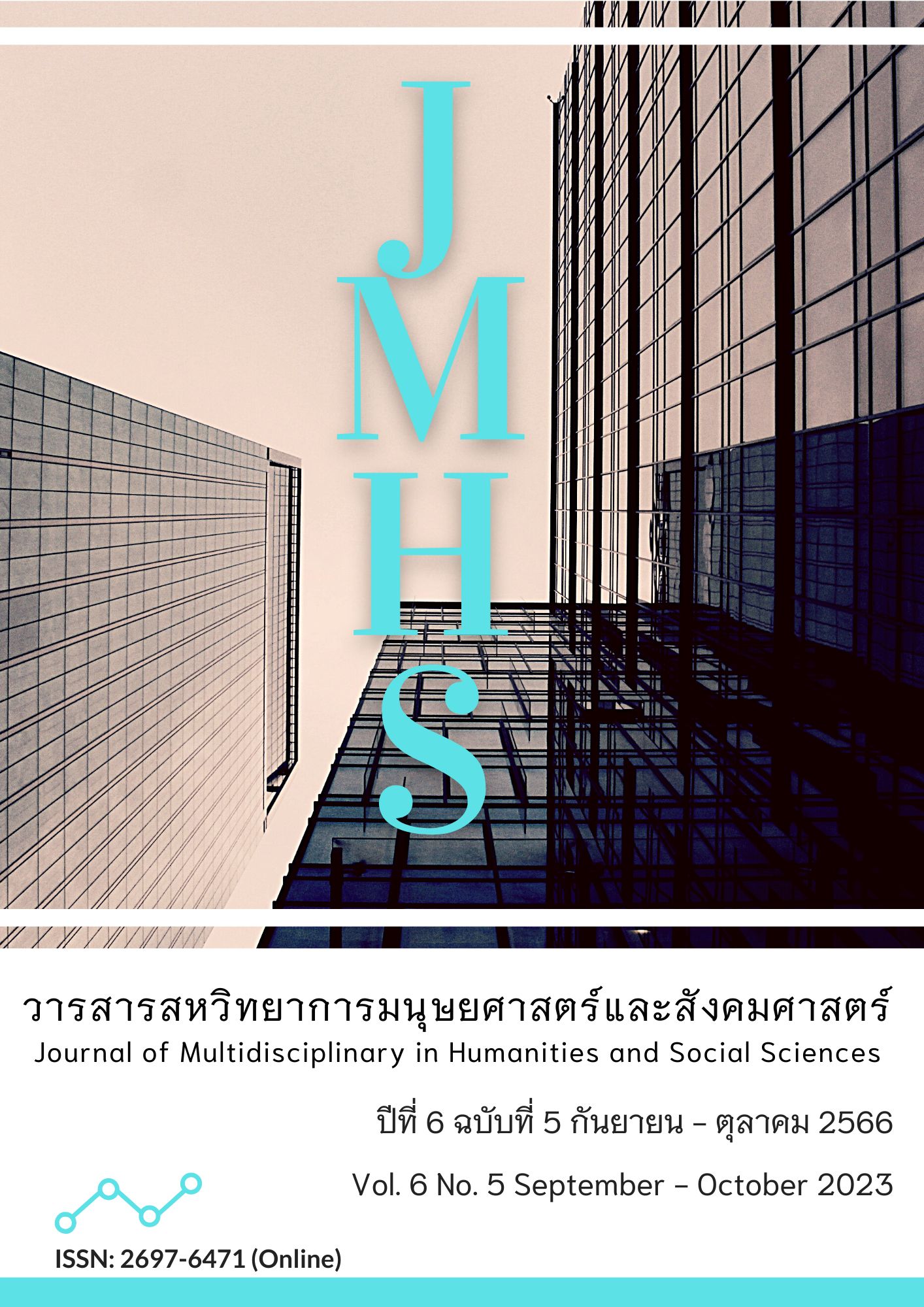Holistic Development of the Quality of Life According to Sufficiency Economy Philosophy
Main Article Content
Abstract
This research aimed to: 1) study the concept of holistic life development, which includes developing behaviors and physical conduct to understand and adapt to societal norms, fostering creativity and happiness in life, understanding ethics and living a good life, maintaining emotional stability despite global changes, acquiring knowledge and wisdom to comprehend life and its problems, engaging in human interactions to accept diversity, and utilizing these experiences to improve oneself and society; 2) explore the principles of a self-sufficient economy: The middle path that can solve problems and develop as a whole comprises three interconnected factors: moderation, cause and effect, and self-immunity in a positive manner. The two conditions for this are knowledge and ethics; and 3) analyze the holistic development of life based on the principles of a self-sufficient economy: This involves developing a balanced, stable, and sustainable life while being open to change. It includes having immunity in four dimensions: physical and material, social, environmental, and cultural. The knowledge and insights gained from this research arise from interpreting the philosophy of self-sufficiency to encourage sharing through mutual understanding and empathy, with a sustainable sense of interdependence among individuals and groups.
Article Details

This work is licensed under a Creative Commons Attribution-NonCommercial-NoDerivatives 4.0 International License.
Views and opinions appearing in the Journal it is the responsibility of the author of the article, and does not constitute the view and responsibility of the editorial team.
References
จำเริญรัตน์ จิตต์จิรจรรย์. (2562). ปรัชญาของเศรษฐกิจพอเพียง : กระบวนทัศน์ใหม่ของปรัชญาการศึกษาสู่การเรียนรู้ในศตวรรษปัจจุบัน. สิกขา วารสารศึกษาศาสตร์, 6(1), 61-74. สืบค้นจาก https://so05.tci-thaijo.org/index.php/sikkha/article/view/155188/132206
ชัยโรจน์ นพเฉลิมโรจน์. (2565). องค์รวม: การศึกษาเชิงวิเคราะห์ วิจักษ์ และวิธาน. วารสารวิจัยธรรมศึกษา, 5(2), 222-230. สืบค้นจาก https://so07.tci-thaijo.org/index.php/dsr/article/view/2208
ชิสา กันยาวิริยะ. (2564). ภาวนา 4 ตามหลักปรัชญาหลังนวยุคสายกลาง: การศึกษาเชิงวิเคราะห์ วิจักษ์ และวิธาน. วารสารพุทธมัคค์, 8(1), 27-32. สืบค้นจาก https://so01.tci-thaijo.org /index.php/bdm/article/view/259184
ชิสา กันยาวิริยะ. (2565). การศึกษาเชิงวิเคราะห์หลักภาวนา 4 ตามหลักพุทธปรัชญาเถรวาท. วารสารพุทธมัคค์, 7(2), 299-235. สืบค้นจาก https://so01.tci-thaijo.org/index.php/bdm/article/view/259186
ชุมพร ฉ่ำแสง และคณะ. (2555). ความสัมพันธ์ระหว่างกิจกรรมทางกายและคุณภาพชีวิตของผู้สูงอายุในจังหวัดอุดรธานี. วารสารวิทยาศาสตร์และเทคโนโลยีมหาวิทยาลัยราชภัฏอุดรธานี, 6(2), 97-111. สืบค้นจาก https://ph01.tci-thaijo.org/index.php/scudru/article/view/179398
ปรียานุช พิบูลสราวุธ. (2549). เศรษฐกิจพอเพียงและการประยุกต์ใช้ด้านการศึกษา. กรุงเทพฯ: โครงการวิจัยเศรษฐกิจพอเพียง สำนักงานทรัพย์สินสวนพระมหากษัตริย์.
ปรียานุช พิบูลสราวุธ. (2551). คลังหลวงกับหลักปรัชญาของเศรษฐกิจพอเพียง. กรุงเทพฯ: เพชรรุ่ง การพิมพ์.
ปัทมา ผ่องศิริ, กุลธิดา กุลประฑีปัญญา, นันทรียา โลหะไพบูลย์กุล และ สอาด มุ่งสิน. (2561). คุณภาพชีวิตภาวะสุขภาพจิตและความสามารถในการช่วยเหลือตนเองของผู้สูงอายุ: กรณีศึกษาเขตเมืองอุบลราชธานี. วารสารเกื้อการุณย์, 25(2), 137-151. สืบค้นจาก https://he01.tci-thaijo.org/index.php/kcn/article/view/161112
เมธา หริมเทพาธิป และ รวิช ตาแก้ว. (2566). สังคมแห่งการแบ่งปันตามหลักปรัชญาของเศรษฐกิจพอเพียง: การศึกษาเชิงวิเคราะห์ วิจักษ์ และวิธาน. วารสารพุทธมัคค์, 8(1), 54-65. สืบค้น จาก https://so01.tci-thaijo.org/index.php/bdm/article/view/261134
เมธา หริมเทพาธิป. (2563). การมีส่วนร่วมในมุมมองหลังนวยุค. รมยสาร, 16(3), 63-77. สืบค้นจาก https://so03.tci-thaijo.org/index.php/jhusoc/article/view/211042
วิศิษฐ์ ฤทธิบุญไชย. (2561). การปรับใช้หลักปรัชญาของเศรษฐกิจพอเพียงที่มีผลต่อการพัฒนาคุณภาพชีวิต ของนักศึกษาในจังหวัดนครปฐม. วารสารสังคมศาสตร์วิจัย, 9(2), 287-302. สืบค้นจาก https://so02.tci-thaijo.org/index.php/ssr/article/view/213597
วีนัส ธรรมสาโรรัชต์. (2566). การพัฒนาคุณภาพชีวิตแบบองค์รวมตามหลักภาวนา 4 ของผู้สูงอายุในยุคชีวิตวิถีใหม่. วารสารสหวิทยาการนวัตกรรมปริทรรศน์, 6(3), 77-89. สืบค้นจาก https://so04.tci-thaijo.org/index.php/jidir/article/view/260512
สุขสันต์ อิทธวิทยาวาทย์. (2559). ปรัชญาเศรษฐกิจพอเพียง: การศึกษาแนวคิด และการประยุกต์ใช้ในสังคมไทย. วารสารวิจัยและพัฒนามหาวิทยาลัยราชภัฏเลย, 11(38), 95-104. สืบค้นจาก https://so05.tci-thaijo.org/index.php/researchjournal-lru/article/view/100130
อภิชัย พันธเสน. (2560). สังเคราะห์องค์ความรู้เศรษฐกิจพอเพียง. กรุงเทพฯ: กองทุนสนับสนุนการวิจัย.
อับดุรเราะฮหมาน มูเก็ม และดเรศ ออสันตินุตสกุล. (2566). การเติบโตตามหลักปรัชญาของเศรษฐกิจพอเพียงของศูนย์กสิกรรมจิตวิญญาณ การดำรงอยู่ประเทศภูฏาน. วารสารสังคมศาสตร์วิจัย, 14(1), 1-20. สืบค้นจาก https://dept.npru.ac.th/jssr/data/files/14.1jssr1.pdf
Campbell, J., & Schraiber, R. (2013). The well-being project. California: California Department of Mental Health.
Power, M. J., Bullinger, M., & the WHOQOL Group. (2002). The universality of quality of life: An empirical approach using the WHOQOL. In. E. Gullone & R. A. Cummins (Eds.), The university of subjective well-being indicators. (pp. 129-149). Netherland: Kluwer Academic Publishers.


